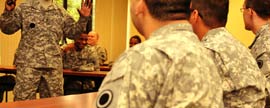NOTE: We have received several questions concerning unannounced FOR RECORD APFTs. This response was posted in a previous Q&A but was buried deep in a chain of responses. It was important enough that I thought we should give the response its own Q&A for clarity.
If the Commander requires more than two APFT test a year there is no separation requirement. The purpose of the 4 month separation clause is to prevent Soldiers from taking advantage of the system and lets say a Soldier takes 2 Record APFTs in 3 months then the Soldier does not have to take a PT for at least another 10 months. Basically the separation clause is designed to ensure that Soldiers remain physically fit during the entire year.
With regard to the notification for an APFT. There is nothing that <strong>requires</strong> the Commander to provide advanced notification for an APFT test. Let’s say you took a FOR RECORD APFT 2 months ago, and the Commander decides to conduct another FOR RECORD APFT test in 2 weeks. Let’s look at the following Scenario
<strong>Leadership Scenario.</strong>
For the purpose of this scenario today is Wednesday.
Sergeant Jones is a high speed NCO in the unit that is totally squared away. He is a role model to several Soldiers and NCOs within the unit. SGT Jones has scored 300 on the last 10 FOR RECORD APFT tests. On the extended scale he has scored as high as 425. One of his NCOER physical fitness goals is to be the battalion PT STUD by winning the Battalion Iron Man Competition that will be held in the next 30 days.
On Tuesday evening SGT Jones completed an incredibly intense and aggressive free weight workout. His workout was designed to maximize his upper body strength and tear down his muscle tissue so he could build more muscle. It is Wednesday morning at 0625 right before PT formation. The Soldier is sharing comments about last nights “KILLER” workout session. He is also complaining that while it was a great workout he is incredibly sore and he hopes the 1SG will be conduct some type of Cardio session for today’s PT session so he can take it easy on his upper body.
The 1SG calls the unit to attention and announces that today for Physical Training the unit will undergo a FOR RECORD APFT! There is an audible groan through out the ranks. You can hear one Soldier say: Come on TOP! We just took a FOR RECORD APFT 2 months ago. The 1SG responds in a professional manner “and we will take another one today.” The unit then prepares for movement to the APFT testing location.
While SGT Jones is waiting for the APFT test to begin he approaches his platoon sergeant and explains his concerns because of last nights’ workout session. He tells the platoon sergeant he is sore and worried he will not be able to score a 300 on the APFT and that it is not smart for him to take the APFT today as he could possibly hurt himself after last nights’ workout. The platoon sergeant concurs and escorts SGT Jones over to see the 1SG. While discussing the issue with the 1SG Conrad, the Commander (CPT Short) comes by and says Good Morning Gentlemen! What’s going on? The 1SG says. “Sir, SGT Jones has just explained that he had an incredibly brutal upper body exercise session last night and he is concerned he will not be able to score a 300 on today’s APFT but more importantly he is concerned that pushing himself on the PT test might actually cause him some harm because he really pushed himself hard last night. He has already volunteered to take the FOR RECORD APFT on Friday which is our make up day for the test anyway. So I think it would be wise if we make him a grader for today and allow him to make up the test on Friday. This allows his body time to adequately recover, puts him in the best position to score a 300 on the APFT, and also allows him to compete in the Battalion Iron Man Competition next month. If he does not score a 300 today, he cannot compete in the Iron Man competition because only individuals scoring a 300 on their most recent FOR RECORD APFT can participate.
The Commander thinks for a moment and then replies: “SGT Jones, you are a PT Stud and I fully understand where you are coming from but I am confident based on your past performance you will do incredibly well on the APFT test.” SGT Jones, then states: “Sir, I am hurting pretty bad and if I don’t score a 300 on this test I can’t compete in the IRON MAN competition. Sir, you know I don’t whine about being in pain or try to dodge my responsibilities. I could really use your help and support on this one!
Captain Short, stares off into space for a second or two and then replies “<em>Look SGT Jones, I understand I really do but if I make an exception for you then I have to make exceptions for others</em>. Now get out there and score another 300. I have faith in you and I know you can do it!” In a disappointed voice SGT Jones states: “Roger, Sir”
Ten seconds in to the push up event, SGT Jones is knocking out pushups just as smoothly as he always does but you can see the pain in his face. As he starts down for his next pushup, SGT Jones lets out a BIG GROAN, and collapses to the ground. He rolls over grabbing his right arm. As he rolls over it appears his arm is just dangling from the elbow down. It is extremely disfigured, swollen, and bruised. He is evaluated by the medic at the test site and is rushed to the emergency room.
strong> 0830 hours- Unit Orderly room</strong>- The Commander returns to the unit and says “Hey 1SG any word on SGT Jones?”
Yes Sir, we received notification that he has a torn bicep and that he will have to undergo emergency surgery to repair the damage. The Doctor also stated that there is a strong possibility that they may not be able to totally repair the damage and that he may not regain full use of his arm.
The Commander says “Wow that’s pretty bad. I really feel for the guy.” The 1SG response with “Yes Sir it is, but it gets even worse.” How so says the Commander?
Well SFC Goodness, his platoon sergeant was with SGT Jones in the ER. When the Doctor came into examine SGT Jones, he said the injury was incredibly bad, perhaps the worst he has ever seen in his 12 years of practicing medicine. He then asked how it happened? SGT Jones, replied that it occurred while doing Push UPs for a Physical Fitness Test. The Doctor looked puzzled and said, “A PT Test? this should not have occurred from a simple PT Test.” He then asked SGT Jones if he had been doing anything of a significant nature in the past 24-72 hours preceding the APFT that required heavy or intense lifting? SGT Jones, said yes he had conducted an intense upper body workout the night prior. So then the Doctor looked at SGT Jones and said “So let me get this straight, you knowingly you did an intense workout that you admit was a “Killer workout”, the night before a FOR RECORD APFT TEST, that is flat our insane Soldier, don’t you know better.” SGT Jones, then says “Sir, that’s just it, I did not know about the APFT until this morning. Our Commander believes in no notice FOR RECORD APFT test, if I would have known about the APFT test I would not have done the training. The Doctor Replied “So why didn’t you inform the Commander or 1SG so they could excuse you from the APFT test?” SGT Jones replies “I did Sir, but the Commander stated if he made an exception for me, he would have to make exceptions for other people. He then told me to get out there and score a 300 on my APFT. The Doctor then looked at SFC Goodness and said “Sergeant did it happen this way?” and SFC Goodness replied that it did happen as SGT Jones explained.
SFC Goodness, said at this point the Doctor became furious. He then called the Hospital Commander, JAG, and the IG. He asked JAG to investigate the matter fully. He requested a formal 15-6 investigation be started against the unit Commander for abuse of subordinates and knowingly placing a subordinate’s health and livelihood in jeopardy. He requested JAG oversee the a formal line of duty investigation into SGT Jones’ injury because the injury was so severe it could result in SGT Jones being medically separated from the service.
CPT Short swallows hard and says “Holy Crap, I had no idea he could be injured like that by doing a PT test. I guess I better go pass this information on to the Battalion Commander.”
The 1SG replies with “Hey Sir, there is more to the story.” The Battalion Commander was notified by the Hospital Commander about SGT Jones, and he also got a phone call from the JAG. The Battalion Commander wants to see you immediately and he has temporarily placed the XO in charge of the company.” Are you telling me the Battalion Commander has relieved me of Command? No Sir, I am simply relaying the message the Battalion Commander personally gave me about 10 minutes ago when he stopped by to see if you were back from PT yet.
This is a hard lesson learned. <strong>Bottom line</strong> treat your Soldiers the way you want to be treated. Use some common sense. It goes a long way in reducing risks and helping leaders make the right decision.
As the scenario above illustrates it is important that leaders fully understand the unintended consequences of their actions. The Commander had no intention of causing injury to SGT Jones. He incorrectly assumed the risk of injury was low. The Commanders poor risk assessment and failure to use common resulted in the following:
1. SGT Jones did not achieve his goal of 11 successive perfect scores on the APFT.
2. SGT Jones could not compete in the BN IRON MAN Competition.
3. SGT Jones was severely injured and his future in the Army is at risk.
4. The unit Commanders career has been placed in jeopardy as a result of his poor decision making process.
5. It is highly probable the unit Commander will not receive a top block on his OER. He will be fortunate to receive a good Command OER.
6. The unit Commander gained a lot of attention from the BN and BDE Commander. Given the nature of this incident and the fact that the Doctor called the Hospital Commander, JAG, and IG it is safe to assume the Division Commander was notified as well.
7. It is safe to assume that the unit will most likely receive a lot more attention from the BN CDR and his BN Staff.
8. I imagine the company policy of unannounced FOR RECORD APFT’s will be reevaluated and discontinued as it has no measurable value.
<strong>Reasons a Commander Should Avoid Using an Unannounced FOR RECORD APFT Testing Protocol.</strong>
These reasons include but are not limited to:
1. Low morale
2. Soldiers who have aggressive after duty hours physical training programs cannot train properly with an unannounced FOR RECORD APFT policy without risking injury to themselves or at a minimum risking a lower score on the APFT because they potentially overtrain the night before a FOR RECORD APFT Test.
3. The unit will typically have lower APFT scores across the board. The Commander reports these numbers in their Quarterly Training Briefing. So the Commander looks bad because his unit has low PT scores and a low overall average.
4. Typically units with unannounced APFTs have an increased injury rate
5. Typically these units also experience longer recovery times
6. Retention rates may also be lower as Soldiers do not believe their leaders care about them or their safety.
<strong>It is my opinion that unannounced FOR RECORD APFTS have more risks than benefits associated with them.</strong><em>
<strong>Related References</strong>
<strong>AR 350-1 paragraph 1-24e(2) states:
</strong>
<blockquote>Commanders may administer the APFT as often as they wish; however, they must specify beforehand when the results are for record. The AA and Active Guard/Reserve (AGR) Soldiers will take the APFT at least twice each calendar year. A minimum of 4 months will separate record tests if only two record tests are given. The intent is for the Active Army and the AGR Soldiers to take a record APFT every 6 months. Mission requirements often prevent the even spacing of record tests. Therefore, commanders are encouraged to test Soldiers for record as close to the record test window as possible.</blockquote>
<strong>AR 350-1 paragraph 1-24e(5) states:
<blockquote>Soldiers who fail a record APFT for the first time or fail to take a record APFT within the required period will be flagged in accordance with AR 600–8–2.</blockquote>
<strong>FM 7-22</strong>
<strong>FM 7-22 paragraph 1-12.</strong>
<blockquote>All Army training is based on the principle “Train as you will fight;” therefore, the primary focus of PRT goes far beyond preparation for the APFT. Soldiers improve their physical readiness capabilities through PRT. For Soldiers to achieve the desired standard of physical readiness, every unit training program must include a well-conceived plan of PRT. Training must be both <strong>realistic</strong> and performance-oriented to ensure physical readiness to meet mission/METL requirements.</blockquote>
Notice I placed the “Realistic” in bold as I do not believe an unannounced “FOR RECORD APFT” testing policy is realistic.
<strong>FM 7-22 paragraph 5-20</strong>
<blockquote>Schedule APFTs so Soldiers have advance notice. Preferably, the APFT should be scheduled on Monday to allow for recovery provided by the weekend. If the APFT is not conducted on a Monday, no strenuous PRT should be conducted on the day before the APFT. The conduct of the PD, 4C, HSD,and RD provide an active recovery day before the APFT (refer to Table 5-3, Session 2-5).</blockquote>
Notice I bolded the entire statement above as it reinforces my point about advance notification and the employment of common sense. However this is only a guideline.
<strong>FM 7-22 paragraph 5-28</strong><strong>
<blockquote>Army Physical Fitness Tests will be conducted according to Appendix A of this FM and the course POI. Preferably, the APFT should be scheduled on Monday. If the APFT is not conducted on a Monday, then no PRT is scheduled on the day before the APFT.</blockquote>
<strong>FM 7-22 paragraph 5-42 </strong>
<blockquote>The APFT is best conducted on Monday to ensure adequate recovery and performance.</blockquote>
<strong>
FM 7-22 paragraph A-8.</strong>
<blockquote>The commander should ensure that testing is consistent with regard to events, scoring, clothing, equipment, and facilities. Testing should be planned to permit each Soldier to perform at his maximal level and should ensure the following:
Soldiers are not tested when fatigued or ill.
Soldiers do not participate in tiring duties before taking an APFT.
Weather and environmental conditions do not inhibit physical performance.
Risk analysis is conducted</blockquote>
<strong>Summary and Alternative Solutions For APFT Testing</strong>
Based on my experience I can see no benefit to conducting an unannounced “FOR RECORD APFT”. On the contrary I can see nothing but adverse consequences for such a testing program.
There are several ways to manage a unit APFT testing schedule that do not require more than 3-4 FOR RECORD APFTs per year. These include:
1. Scheduling FOR RECORD APFTs in March and September each year. These months tend to have weather that is best suited for taking an APFT. Then schedule 2 make up tests for each FOR RECORD TEST.
2. Quarterly scheduling of FOR RECORD APFTS: This allows the unit and Soldiers assigned to the unit a degree of flexibility. It allows for leaves, profiles, TDY, and other issues that get in the way of a rigid testing protocol.
<strong>Questions Concerning Soldiers that fail to take their APFT and Integration of New Arrivals into the FOR RECORD APFT testing cycle.</strong>
1. <strong>How do I handle Soldiers who fail to take their APFT as scheduled?</strong>
If an individual did not show up for the 1st make up test they were flagged and considered for a bar to reenlistment. If they did not show up for the second make up test they were considered for action under the UCMJ and potentially separation from service.
2. <strong>How do I manage FOR RECORD APFTs for new arrivals to the unit?</strong>
When a new Soldier arrived their DA FORM 705 was evaluated. If they had a recent APFT with a passing score, that score was used. Then we looked at when the next UNIT FOR RECORD APFT would be administered. If possible we waited until the next quarterly test. Otherwise the Soldier was given 45 days to prepare for the FOR RECORD APFT.
3. <strong>How do I keep a unit on a successful FOR RECORD APFT testing cycle?trong>
When the unit tested as a group new arrivals would then test with the unit to get them on the same schedule.
<strong>Did you find this information useful? I appreciate your feedback!
TOP</strong>














